'You have to respect nature. You won't respect nature unless you see nature's fury.'
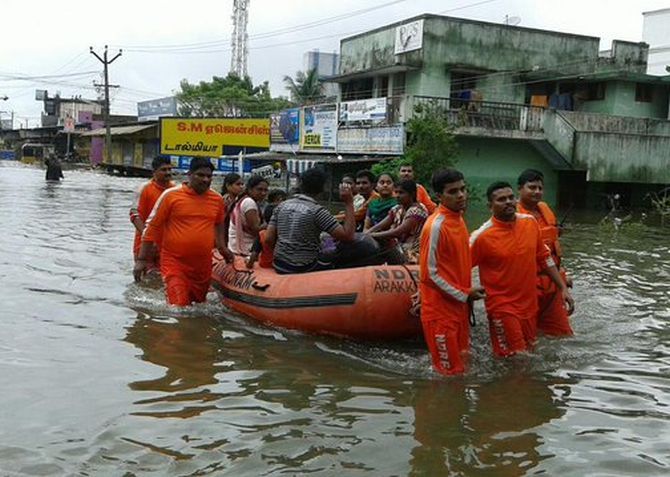
Environmentalist Nityanand Jayaraman is against the corporatisation of the environment. A social activist, he works for the voluntary anti-corporate collective, the Vettiver Koottamaippu.
Jayaraman tells Shobha Warrier/Rediff.com the reasons for Chennai's disaster.
Some experts describe what happened in Chennai as a result of the El Nino effect and climate change while others call it a man-made disaster. As an environmentalist, how do you look at this?
Whether it is climate change or the climate behaving normally, it is natural for the skies to let rain water fall on the ground. If the waters had rained on a place where there were no people or human property, we would not have described this as a disaster. We have to look why the 490mm of rain became a disaster.
You have climate behaving normally and also climate behaving abnormally due to climate change. If a natural event becomes a national disaster, it shows bad landscape planning.
The Chennai floods is an unhappy marriage between climate change and land use change.
When I interviewed M G Devasahayam, he said rain cannot be a disaster and this is a man-made disaster because of corruption.
Climate change is also a man-made disaster. When climate change happens, you can expect intense rain and intense drought. We have disregarded the potential of disaster climate change can cause and put ourselves in this situation by doing all the wrong things hydrologically.
You mean the drainage system?
There are a whole lot of things. When water falls, it has to either go into the ground or it has to flow, and it knows where it has to go and it tries to reach the place.
If you prevent water from going into the ground, you have excess water flowing. And if you prevent the water from flowing, it accumulates and finally bypasses you to flow to where it has to.
The whole idea of wise engineering is to allow plenty of space for the water to soak into the ground, and we have disregarded this by increasing the paved area even in the places where there is lot of sand.
For example, in Uthandi, there is an Academy of Marine Engineering and Technology. The building is coming up on a large sandy area that drains into the Kovalam creek. The sandy areas are fantastic for recharge. What they have done is is they have built an engineering college there with paving all around.
The result is, you have decreased the area of recharge and increased the run off. Naturally, there is flooding there. Two months later, there will be water scarcity because rain water did not soak in there.
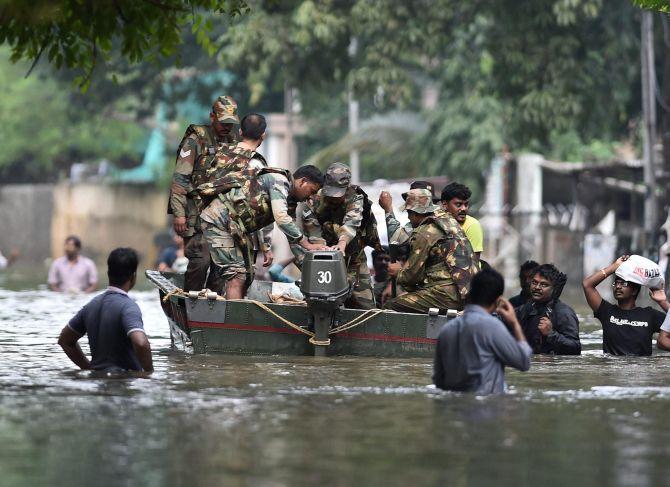
Chennai is a coastal city and it has rivers also. So there was a natural system to take water to the sea. Is it corruption or lack of knowledge or disregard for the environment that has resulted in this?
It is a combination of all. Only when you think about the environment can you disregard it. Environment is not even thought about. If so, would you have the National Institute of Ocean Technology on the Pallikarani marshland?
Then you would not have a large stretch of Ennore backwaters being identified as the hazardous industry zone in the master plan and handed over to the port.
The planners should have been looking at environment from a variety of angles, but when it comes to execution, they are not.
Is it corruption or lack of knowledge?
It is our ridiculous unquestioned notion on development. For us, if India has more buildings, we are developed. If a guy from a village says his village is now developed, it means, there is a flyover, multi-storey buildings and more roads.
Our addiction to what we call development is the reason for this. That allows us not to question a corrupt government.
Who is questioning Tamil Nadu to be a world-class investment destination? Nobody is.
For the party to bring in people from all over the world, we want to dress up Tamil Nadu, and nobody will come here unless there is a large spanking airport and a great road to taken them to wherever they work, and large areas to work.
To please these white people, you encroach the river to expand the airport, you flout all rules to build roads.
The outer ring road in Chennai has encroached upon the Chembarambakkam lake catchment. Out of the four, only one catchment is not cut off. This way, you are blocking water going to the Adyar river and emptying into the sea.
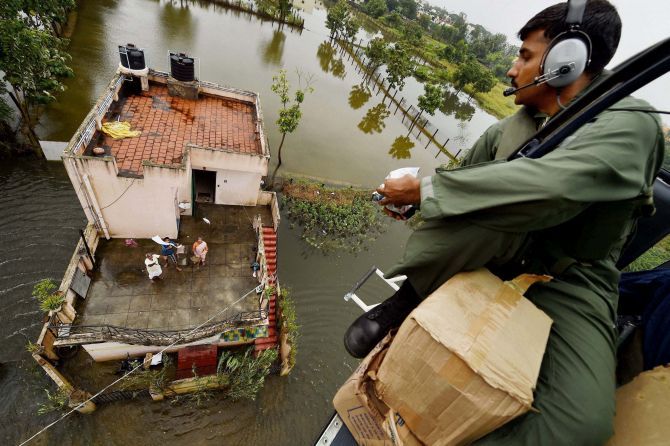
Is this development? A natural drainage capacity cannot be replaced by engineering substitutes.
One of the most flooded areas in Chennai is Velacherry which has destroyed the Palliakarani marshland...
Yes, the Palliakarani marshland used to spread over 50 sq kms. In this 50 sq kms, it will collect, store and discharge water that came from 250 sq kms. From 50 sq kms, the Pallikarani marshland has been reduced 4 sq kms and it has to drain water from the same area.
Now, they have built a huge MRTS station over there so that the IT sector employees can commute. There are hundreds and hundreds of high rise buildings also.
So when water from 250 sq kms comes rushing in expecting Pallikarani marshland to be there, water is not going to withdraw because buildings and IT companies are there! So water is going to stay there.
Some people are blaming inadequate drainage, but I feel adequate drainage is virtually impossible there. Can you replace what was done by 50 sq kms of natural body by what is designed by some engineers?
Impossible! You are not talking about just drainage for Velacherry, but 250 sq kms of catchment.
When you had the Pallikarani marshland, it recharged ground water, allowed birds to nest and there was an entire ecosystem there. A replacement to Pallikarani is not just some concrete pipes.
Palliakarani is an amazing treasure we have lost, rather we have killed.
In the old days, people celebrated when the rains came, today, we are cursing. We are dejected and scared when rains come.
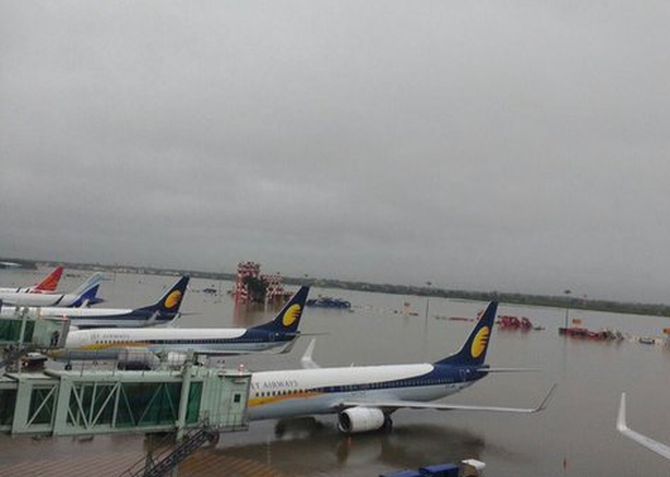
When the authorities wanted to expand the airport encroaching upon the Adyar river bed, many environmentalists objected, but their voices were not heard.
Absolutely. People who speak common sense are called anti-national, terrorists, Naxalites, Maoists, anti-India, unreasonable, anti-development.
What we witness is a collective failure of the growth model.
Which Independent India has been following?
Not after Independence alone. From the industrial civilisation onwards, all economies follow only one growth model, whether it is a Communist State, a capitalist State or a Socialist State.
You mean even the so-called developed countries also disregard environment?
It is the developed countries that brought us to this point -- .85 Celsius warmer world. It is the developed countries that messed up and created the climate change problem.
If you look at cities like Miami, California, New York, Louisiana, they are all reeling under drought. California is reeling under drought. Punjab is going through many other pest problems and drought-like conditions.
They follow one of the dumbest forms of agriculture and unfortunately they were able to sell it to India as part of the Green Revolution.
If there is wisdom in this world, it exists in the societies that are not assimilated into the mainstream which according to us are primitive societies.

Like?
The place where India wants to mine bauxite, a place called Niyamgiri in Odisha. The people of Niyamgiri are the tribal people called Dongria Kondh. They are called primitive tribes by the Government of India, but they call themselves Kondh.
They say leave the bauxite inside for long-term prosperity, but we want it out to make aeroplanes and bombs and that is growth for us. These are the two different civilisational views.
According to them, if we don't touch bauxite, there will be water coming from 36 streams and there will be life spread all over. If we take bauxite out, streams will dry and it will affect human life. But we want bauxite out for the nation to develop.
So we have a civilisational conflict and who is the smart one? Not the one who asks us to change our lifestyle to be more modest?
What kind of change in the lifestyle? The question then is what is growth?
Virtually, every single thing we are doing has to be questioned and changed.
If you are looking at our economy, change the way you produce food, which is produce what nature allows us to. If there is not much water, don't produce what requires more water.
You should not draw more than what is there for recharge. It is like not taking a loan that you cannot repay. But are we doing that?
A radical revision of our lifestyle is required. It is like Alcoholics Anonymous where you first acknowledge that you have a problem. Then a support group helps you come out of it.
As a society, we have to acknowledge that we are consumers, but we are scared to come out of this lifestyle. But we have to find a way to come out of it.
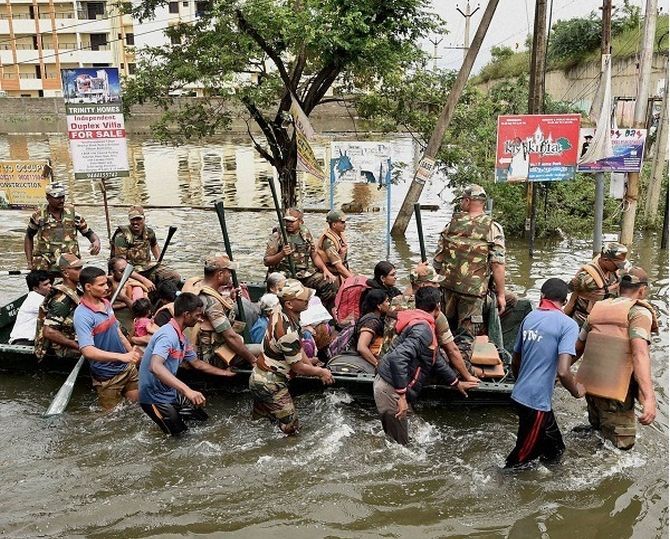
But when you question the lifestyle we follow now with more cars and more concrete structures, are you not called anti-development?
Yes, if cars and concrete structures are development, I am anti-development.
What is development, according to you?
It is very clear. In the process of development, if all the people are secure and resilient to natural events, I will call it real development.
You said lopsided development started with the Industrial Revolution. Does that mean there should not be any industry?
Not the kind we have now, certainly not. I don't think we need new devices to discover things that bomb people you don't even know.
I feel as human beings, we in modern society have become more primitive now while the Kondh tribes are extremely evolved as they know how to live in harmony with nature.
Do you feel earlier civilisations on the banks of various rivers like the Indus Valley Civilisation were more in tune with nature?
No, the Indus Valley or Mohenjodaro were wiped out because they had eaten out whatever was available. They made the environment collapse locally.
Is what we saw in Chennai the beginning of the destruction of the environment?
It is not the beginning. It began 20, 30 years ago and now it is getting worse, and we have not seen anything. If the government is calling 490 mm rain unprecedented, they will have to redefine the word unprecedented every year.
People say, save nature. You don't have to save nature, you save yourself. You have to respect nature. You won't respect nature unless you see nature's fury. Somehow, you feel human beings are exempt from nature's laws. You can't bribe your way out of nature. It's not like bribing a policeman for not wearing a helmet.
Is there a balance between development and environment?
There isn't. Many say there has to be a balance between environment and development. Balance means both sides have to go up and down.
Environment will not do any balancing, all the balancing has to be done by human beings.
Do you think people will learn from this experience?
I don't think so. While I continue to be optimistic, my intellect tells me that people will not learn anything. In January itself, they will forget all the discussions we had in December unless there is another flood that is worse than this.










